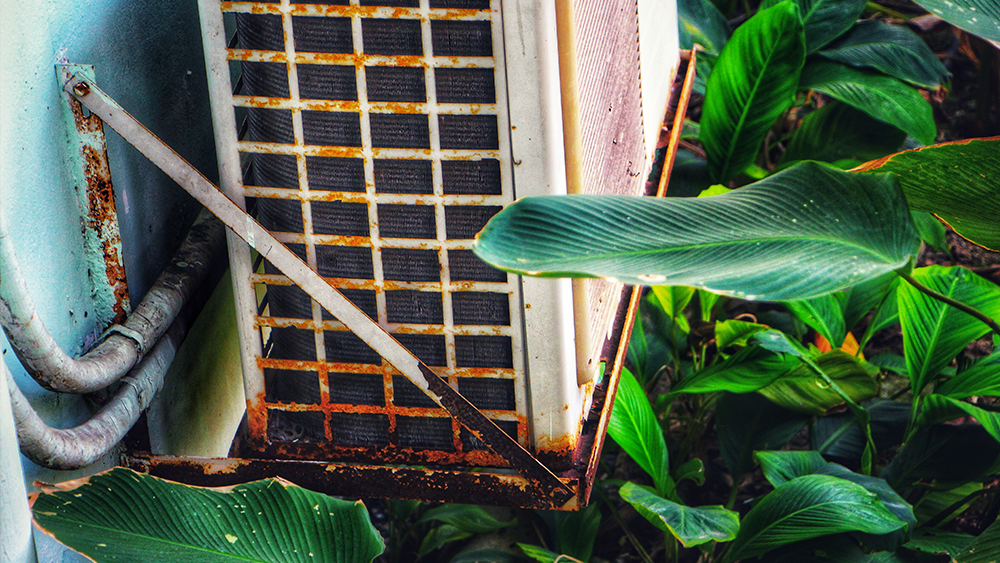Tips to Tackle Rust on Your AC Unit:
1. Clean the Surface:
If your air conditioner has rust, you should start by cleaning it well. To do this, wet the surfaces with warm water and soap, then scrub them to remove any filth or loose rust. If you want to apply rust removers or protective coatings correctly, you need to clean the surface first. To avoid scratching the metal, use a soft brush or sponge, and be sure to fully dry the area to stop any more moisture from rusting the metal.
2. Apply Rust Remover or Sandpaper:
After you’ve cleaned the surface, you can either sand off the rust or apply a rust remover. Small to severe rust patches can be effectively treated with rust removers, which are chemical solutions specifically formulated to eliminate rust.
Once applied, let the rust remover sit for the specified amount of time before wiping it off, as directed by the manufacturer. You can manually remove more serious rust with sandpaper or a wire brush. If you want to keep electrical components undamaged, you should exercise extreme caution while employing these procedures. To avoid harm, it is recommended that you wear protective clothing such as gloves and goggles.
3. Treat with Silicone Spray Paint or Primer Sealer Spray Paint:
It is critical to provide a protective coating to the surface after rust removal to stop further rust formation. A long-lasting protection against corrosion and water can be achieved with primer sealer spray paint or silicone spray paint. Coatings like this serve to both preserve the metal and enhance its visual appeal. After evenly applying the paint according to the manufacturer’s instructions, wait for it to dry entirely before turning on the air conditioner. For rust prevention to last, this is an essential step.
Methods to Keep Your Air Conditioner from Rust:
· Regularly Examine and Debris Coils:
Preventing rust on your air conditioner requires regular maintenance. Keeping an eye on the condenser and evaporator coils is a must. It is important to clean these coils regularly to prevent corrosion by removing dirt, debris, and moisture. Resolve any indications of damage or corrosion promptly by fixing or replacing the impacted components. You can keep your air conditioner running smoothly and efficiently by keeping the coils clean, which also protects them from rust.
· Use Dehumidifiers in Humid Areas:
The main ingredient for rust is water, therefore keeping the relative humidity in your house under control will greatly lessen the likelihood of rust on your air conditioner. Basements and bathrooms, which tend to be somewhat humid, are good places to install dehumidifiers. Lowering the relative humidity in your house makes it less ideal for rust to form. To further reduce the build-up of moisture, check that the ducts are not leaking and that your air conditioner has adequate ventilation.
· Keep Your Home Well-Ventilated:
Another helpful method for preventing rust on your air conditioner is to ensure proper ventilation. Make sure that the system is airtight by sealing any cracks around openings such as windows or doors. If you seal these cracks, water and other contaminants won’t be able to get into the equipment and cause rust. Check the ducts for damage or leaks regularly and fix them right away. In addition to preventing the air conditioner from getting wet, good ventilation enhances the quality of the air within the building and the effectiveness of the system as a whole.
· Address Signs of Corrosion Immediately:
It is critical to act swiftly if you discover corrosion indicators on your HVAC system. If you ignore rust, it will grow rapidly and ruin your property. To keep your air conditioner running efficiently and avoid additional damage, fix or replace corroded parts as soon as possible.
FAQs:
· How Can I Protect Outdoor AC Units from Rust in Coastal Areas?
Living near the shore exposes AC units to salt air, hastening the rust-formation process. Consider installing an outdoor AC unit with a corrosion-resistant coating or utilizing a sacrificial anode rod—similar to those found in water heaters—to draw corrosion away from important components to protect outdoor AC systems in coastal areas.
· Can Electrical Issues Be Caused by Rust in AC Units?
Indeed, rust on air conditioners has the potential to lead to electrical issues, particularly when it reaches circuit boards, wires, or connectors. Electrical connections can become compromised by rust, which can result in poor conductivity, irregular functioning, or even short circuits.
· What Are the Indications That My AC Unit’s Rust Needs Expert Care?
Reduced cooling effectiveness, strange noises, erratic operation, and visible corrosion on important parts like coils, compressors, or fan blades are all indications that your AC unit is rusting and may need professional repair. It is essential to get in touch with a certified HVAC professional if you observe any of these symptoms or suspect damage related to rust.
· Can Rust Be Removed from AC Units Using Do-it-Yourself Methods?
Minor surface rust on AC units can be removed with ease using do-it-yourself techniques. To remove loose rust particles from the damaged region, use sandpaper or a wire brush to gently scrape the surface.
· Is It Necessary to Cover My AC Unit During the Winter to Avoid Rust?
If your AC unit is exposed to outside elements like rain, snow, and debris, covering it during the off-season will help prevent rust. Utilize a weather-resistant, breathable cover made especially for air conditioners to let in air while shielding them from moisture and UV radiation.


